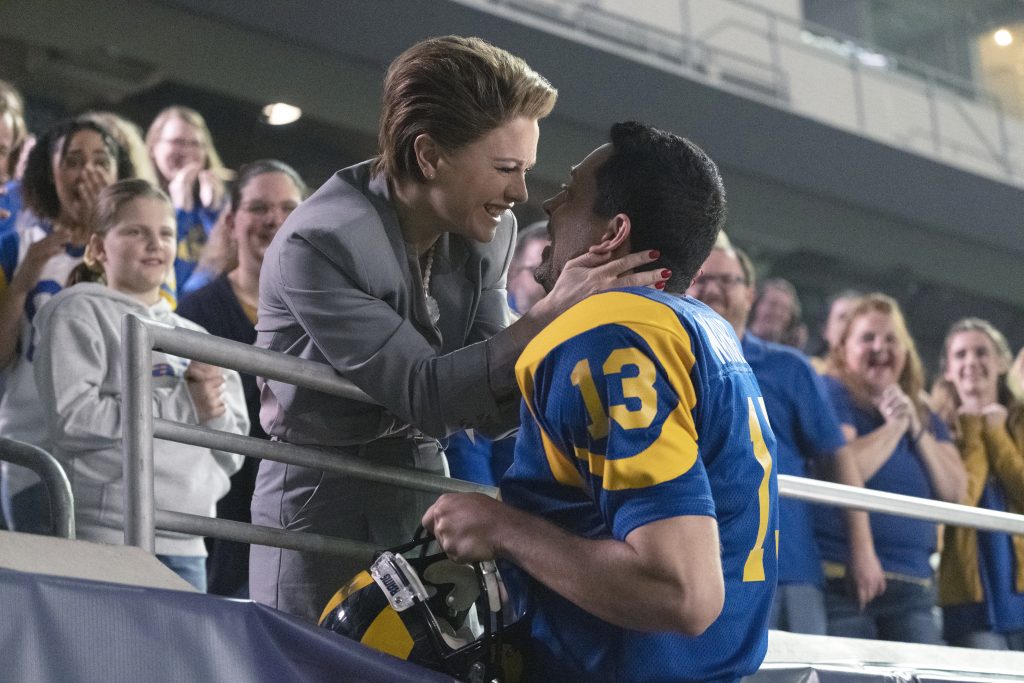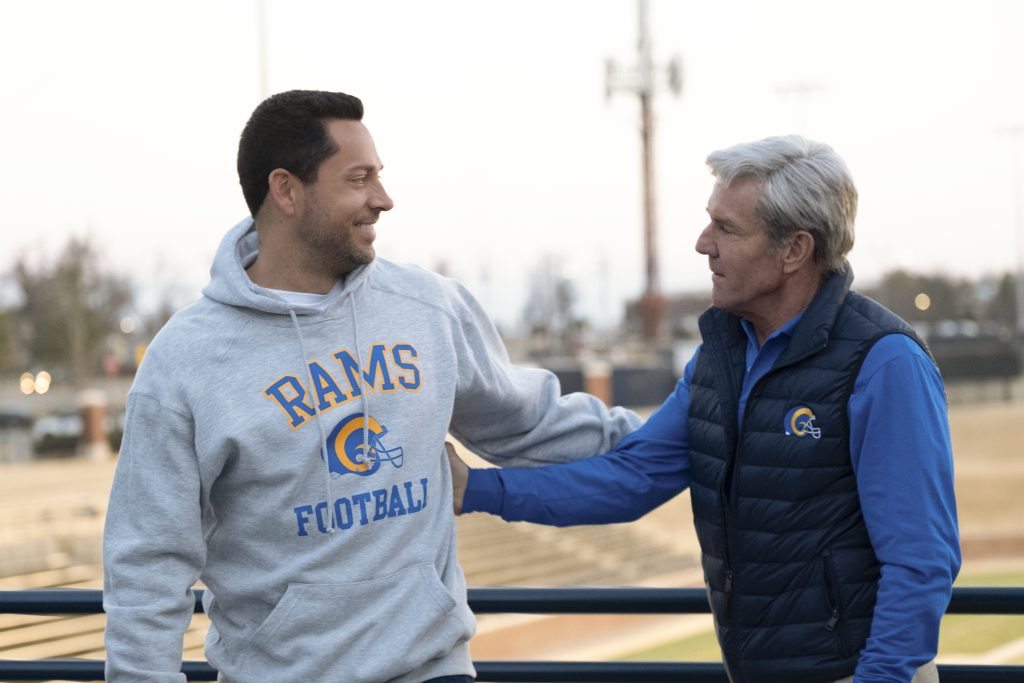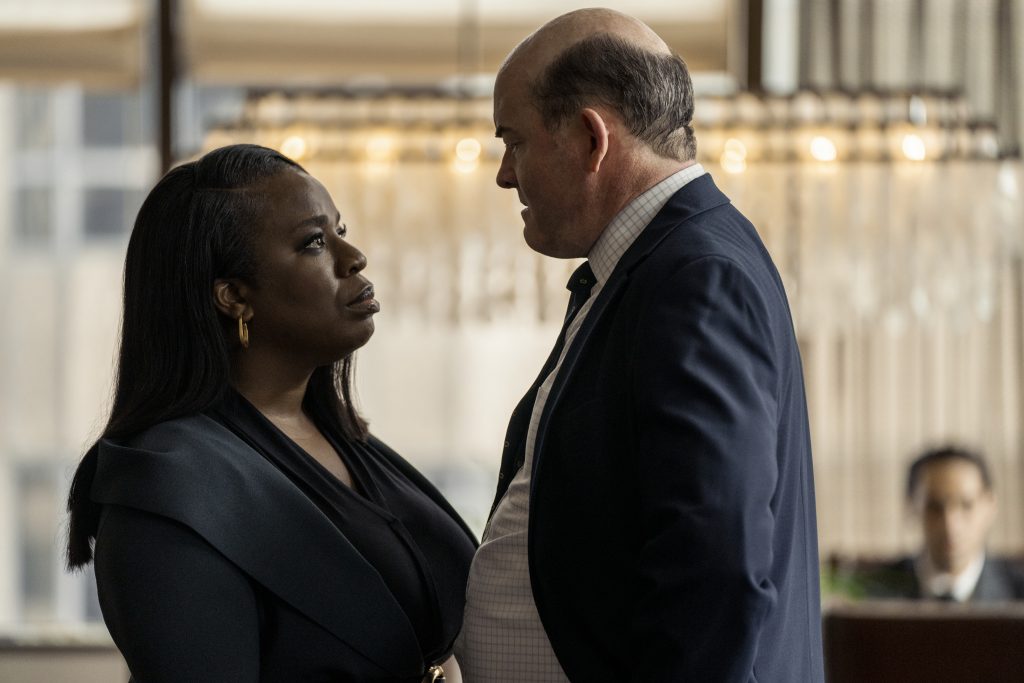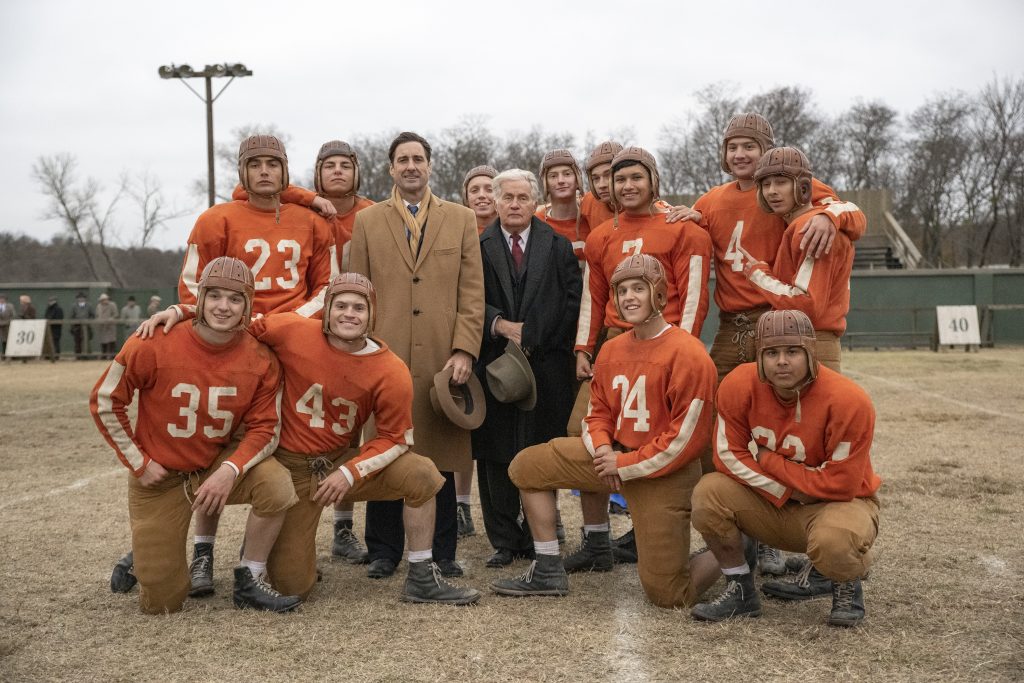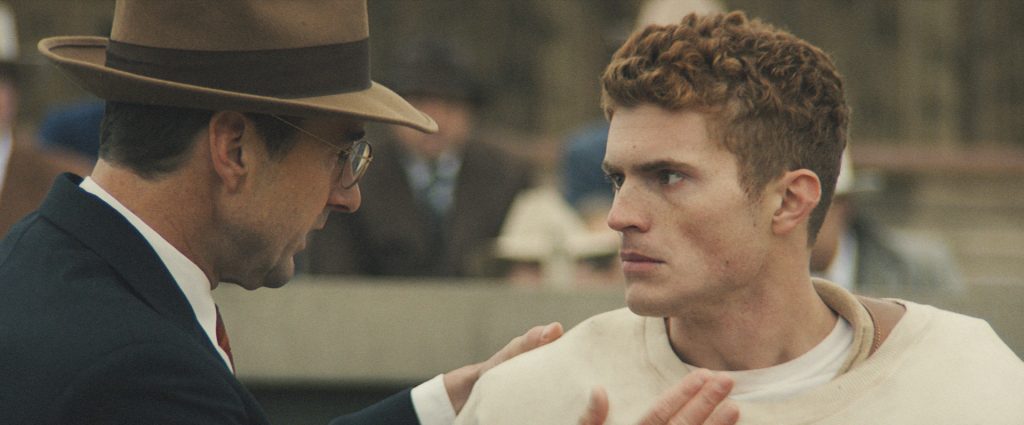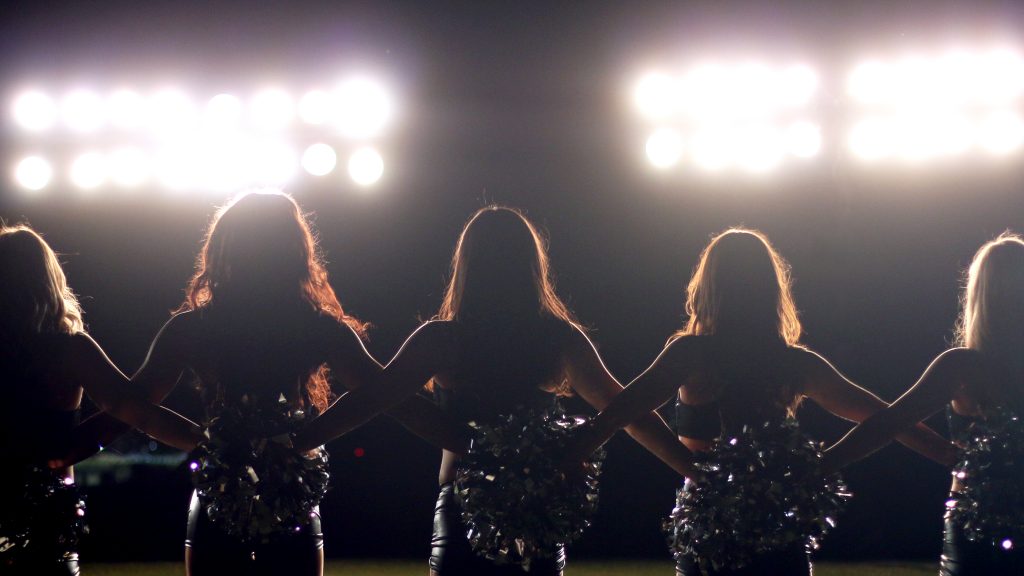July 9, 2023
by Carla Hay

Directed by Travon Free and Martin Desmond Roe
Culture Representation: The documentary “BS High”—about a corruption scandal involving a football team for the illegitimate school Bishop Sycamore High School in Columbus, Ohio—interviews a mix of African Americans and white people representing the working-class and middle-class.
Culture Clash: Roy Johnson took money and young athletes’ dreams to start a U.S. football team affiliated with fabricated high schools.
Culture Audience: “BS High” will appeal mostly to people who have an interest in U.S. football and sports scandals.

“BS High” is a heartbreaking and cautionary tale about con artists taking advantage of young athletes’ hopes and dreams. This documentary is also a helpful guide to see how pathological liars operate and how not to get fooled. “BS High” had its world premiere at the 2023 Tribeca Festival.
Directed by Travon Free and Martin Desmond Roe, “BS High” is an unflinching portrait of a self-admitted con man and several of the victims whose lives were damaged by his lies and scams. The chief villain of the story is Roy Johnson, but he was enabled and helped by other people—most of whom are not interviewed in the documentary, for reasons that aren’t really explained in the documentary. Johnson was considered the mastermind of the schemes he was involved with, and he is interviewed in “BS High.” The interviews with Johnson took place in Los Angeles in 2022.
The documentary confirms that Johnson (who was born in 1980), by his own admission, has a problem with consistently telling the truth, he’s very insecure, and he has serious anger issues. “Anger is a blanket emotion,” Johnson says early on in “BS High,” where he is seen asking some of the documentary’s crew members what kind of body language he should have during his on-camera interviews. “Do I look like a con man?” he asks with a smirk.
“BS High” begins with archival footage of the event that marked the beginning of the scrutiny that led to the downfall of Johnson’s biggest scam. On August 29, 2021, ESPN did a live telecast of a high school football game between the well-known IMG Academy and and the obscure Bishop Sycamore High School at Tom Benson Hall of Fame Stadium in Canton, Ohio. It was one of the most embarrassing football game defeats ever shown on TV. The final score was 58-0, with IMG winning against a team that fumbled and stumbled its way to a resounding loss.
This TV exposure of Bishop Sycamore High School (based in Columbus, Ohio) and the incompetence of its football team led many people to look into what this high school was all about and how they got these football players, many of whom looked a lot older than high-school age. And what was discovered was one of the biggest U.S. football scandals of all time: Bishop Sycamore High School did not exist as an accredited school and did not have academic courses. It was actually the name of a sketchy recruitment program led by Johnson.
“BS High” obviously has a double meaning that is pointed out in the documentary. BS can stand for Bishop Sycamore, and it can stand for “bullshit.” The latter is what Johnson has been accused of serving up for many years by many people. He is still embroiled in lawsuits for fraud and unpaid bills. In “BS High,” Johnson dismisses the dishonest way that his football team ended up on ESPN. He says all that matters was that the team made it that far to be in a game that was televised on ESPN.
This “all publicity is good publicity” attitude seems to fuel a lot of Johnson’s motivation to participate in this documentary, as he brags about how far he took his schemes, with little or no regard for the people he hurt along the way. Johnson acts as if it’s an accomplishment that he’s now the subject of a documentary because of all his troubling actions. But instead of Johnson coming across as a movie star, he comes across as someone desperately trying to spin his story and create more smoke and mirrors for his already ruined reputation.
Journalist/author Andrew King says in “BS High” that he isn’t surprised that Johnson agreed to be interviewed for the documentary: “He could be the next in a long line of people who falls on his own sword because he talks to much in a documentary.” Not only does Johnson talk a lot, he also heinously laughs when he thinks about his scams and how many people he fooled. And, at times, he gets angry and blames his victims for being “stupid.”
“BS High” gives some background info, most of it told by Johnson, to give context for how he turned out the way that he did. Johnson says that as a child, he was obsessed with the action TV series “The A-Team” and identified the most with Colonel John “Hannibal” Smith, the leader of the team, played by actor George Peppard. “I literally thought I was Hannibal,” Johnson comments. The Hannibal character in “The A-Team” was a military commander, a strategist, a master of disguises and an amateur actor. Hannibal’s signature line was “I love it when a plan comes together.”
Like many con artists, Johnson failed in a career where he targeted people as victims. By his own admission, Johnson says that he was a failed athlete. Johnson says that he got an internship with the New England Patriots, which influenced him to want to become a general manager in professional football. Around the same time, Johnson says he was “mentoring” his younger brother, who accomplished something that Johnson could not accomplish: He got a football scholarship.
Johnson says in the documentary that his “mentoring” of his younger brother led to his interest in helping other young football players. “For me,” Johnson says of this brotherly “mentorship” experience, “it was an opportunity to take it from helping my brother and a few people to an entire school.” It’s doubtful that anyone in Johnson’s family is looking up to him now. None of his family members is interviewed in this documentary.
Eventually, Johnson teamed up with John Barnham Sr. to co-found Christians of Faith Academy, a non-profit group aimed at helping underprivileged youth, most of whom are African American. Even though the word “academy” was in its title, Christians of Faith Academy was never an accredited school and didn’t have any academic courses. Instead, it was essentially a recruitment program for teenage football players, with Johnson as the head “coach.”
Many of these children and their parents willingly went along because they thought this program was legitimate and because Johnson filled their heads with big promises that he could turn their sons into college students with football scholarships who could then become National Football League (NFL) recruits. The Christians of Faith Academy, for a while, was funded by money that was flowing in from donations and sponsors that Johnson takes most of the credit for getting, even though he had no previous experience in managing an athletics program for high schoolers. Johnson has never had the required permit to coach high school football.
“BS High” co-directors Free and Roe are heard off-camera occasionally asking Johnson some interview questions or responding to some of the things he says. At one point, Barnham’s name is mentioned to Johnson, who acts like he doesn’t remember who Barnham is. Eventually, Johnson admits that Barnham was his partner in Christians of Faith Academy, but Johnson insists that Barnham wasn’t as involved as Johnson was in managing the academy. Barnham does not say much in the documentary, but Barnham says that he’s not surprised that Johnson pretended not to remember Barnham.
Johnson freely admits to having a “fake it ’til you make it” attitude. He says of his philosophy to get money out of people: “Do what the people who have money do, even if you don’t have the money.” Johnson also admits that he is “insecure” and “very resourceful.” He adds, “And that’s a very bad combination.”
And what that “bad combination” led to was Johnson overspending and not paying hefty bills. Johnson shrugs off his debts (the documentary estimates that he owes hundreds of thousands of dollars to untold numbers of people, some of whom are suing him) as if it’s just his way of doing business. Johnson and other people in the documentary say that his attitude has always been that he needs to spend money in order to make money.
As a religious non-profit group, the Christians of Faith Academy was allowed to get certain tax breaks. What the Christians of Faith Academy was not allowed to do was misrepresent itself as a school for academics when soliciting donations and other funds. The downfall of the Christians of Faith Academy began when the African Methodist Episcopal Church withdrew its support after reports began surfacing that the Christians of Faith Academy was not a legitimate school and funds were being mishandled.
In “BS High,” Johnson makes an “X-Men” reference when he talks about how he tried to prevent the Christians of Faith Academy from being shut down: “I’m Magneto. These are my mutants, and I’m fighting for them.” In Marvel’s “X-Men” comic books and movies, the main characters are mutants. Magneto is a mutant villain. After Christians of Faith Academy went out of business, Johnson founded Bishop Sycamore High School.
Ben Ferree, a civil rights investigator who used to work for the Ohio Athletic Association Foundation, was one of the first people to do an in-depth investigation into Johnson’s shady business dealings. Ferree says that the Christians of Faith Academy and Bishop Sycamore High School were the same scams under different names. Bishop Sycamore High School was also registered as a religious non-profit group.
Many of Johnson’s athlete victims dropped out of real high schools in order to get “training” at Bishop Sycamore High School. And in some cases, the documentary alleges that certain Bishop Sycamore High School “students” were actually over the age of 19, which is the cutoff age to play in league-sanctioned high school football. IMG Academy (which is based in Bradenton, Florida) is a famous training institution for high schoolers to be recruited into National Collegiate Athletics Association football. Bishop Sycamore High School was marketed as being like an IMG Academy for Ohio.
More powerful than any of Johnson’s statements in the documentary are the interviews and testimonies from the football players who got pulled into Johnson’s schemes. Trilian Harris, Adrian Brown Jr., Justin Daniel, ZyShawn Johnson (no relation to Roy Johnson), Isaiah Miller, Mecose Todd, Kymetrius Gates and Quincy Talmadge all talk about what it was like to be fooled by Roy Johnson, who dangled promises of making them star football players who could be recruited for football scholarships by top-tier football universities, which would then pave the way to fame and fortune in the NFL.
All of these victims describe Roy Johnson as being very charismatic but also having a cruel side that took pleasure in verbally and physically abusing them. Roy Johnson admits to having a history of violence, including beating up homeless men. The documentary also mentions Roy Johnson being arrested in 2020, for physically assaulting his girlfriend at the time. The outcome of that domestic violence case is mentioned in the documentary.
At first, Roy Johnson’s football victims were dazzled by what seemed to be Johnson’s successful image. But over time, they saw many things that were wrong and inappropriate about the “training” and road trips they would take. It’s alleged in the documentary that money became so scarce, Johnson ordered his young athletes to steal food for them to eat. They also witnessed Johnson commit violence against them and other people.
More than any money that could have been defrauded is the incalculable emotional cost and the sense of betrayal that the victims feel. Some of his victims, such as Harris, describe having some form of post-traumatic stress disorder because of what they experienced during their time “training” with Roy Johnson. Daniel breaks down and sobs when he describes how being involved in Bishop Sycamore High School ruined his chances of getting into a good college. Harris was admitted into Grambling State University, but he had his admission revoked when the school found out that he was affiliated with Bishop Sycamore High School.
And where were the parents during all this scamming? Only two parents are interviewed in the documentary: Harris’ mother Kristi Ferguson and Talmadge’s mother Erica Cain. They both echo what their sons say about being fooled by Roy Johnson’s smooth-talking ways. Both mothers also say that because of their financial struggles raising their sons as single mothers, they were grateful at the time that someone was taking an interest in training their sons to get football scholarships.
Other people interviewed in the documentary include journalist Bomani Jones; videographers Mike Moline and Anthony Marino, who were briefly hired by Roy Johnson during his Christians of Faith Academy days; and Dave Pando, the owner of a paintball business that says Roy Johnson still owes $800 on an unpaid bill. When Roy Johnson is asked about this unpaid paintball bill, he laughs and says he doesn’t remember anything about this debt, but if it exists, he says it’s chump change to him.
Roy Johnson has a nonchalant, cold or angry victim-blaming reaction when he’s asked how he feels about what he did to his victims, especially those whose young lives he altered in very damaging ways. During one comment, Roy Johnson shrugs and says, “Life happens.” During another comment, he says of his long history of deception: “I’m a con man-ish.” In another comment, Johnson says with no irony whatsoever, “I’m the most honest liar I know.”
But a moment comes when Roy Johnson’s cocky façade comes off, and he looks shaken to the core. During an interview, Harris calls Roy Johnson “evil” for what Roy Johnson did to his victims. Roy Johnson and Barnham, sitting next to each other, are shown this comment on a laptop computer. Barnham says nothing, but guilt and remorse are shown all over his face. Roy Johnson angrily gets up and storms out of the interview and says that it’s all a set-up to make him look bad. Later, Roy Johnson comes back to resume the interview, and he tries to look like he’s the victim.
Some people might have criticisms about “BS High” giving Roy Johnson the publicity he obviously craves. However, anyone who watches the entire documentary will see that “BS High” does not make Roy Johnson look glamorous or make him look like an anti-hero. It does the opposite: It exposes his duplicitous personality and shows how cowardly he can be when he’s confronted with the damage that his misdeeds have done.
Many viewers watching “BS High” will be infuriated by how certain people featured in this documentary got away with certain injustices for as long as they did. “BS High” could have done more to explain why certain enablers aren’t in the documentary or what comment, if any, they had if they were contacted by the “BS High” filmmakers. However, “BS High” is an urgent wake-up call to look at the bigger picture of a system that allowed this abuse and fraud to thrive in the first place and what should be done to prevent this abuse and fraud in the future.
HBO will premiere “BS High” on August 23, 2023.

